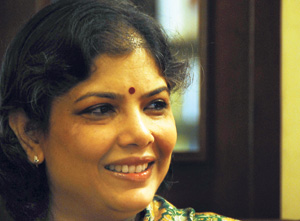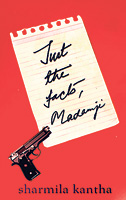When she heard that her husband's new posting was to Sri Lanka, the first thing Sharmila Kantha did was look up the Galle Literary Festival. That was the writer in her surfacing. And last month, she was, like any other eager book lover down in Galle absorbed in the literary whirl, fascinated by the likes of Ian Rankin talking of his Inspector Rebus and Mohamed Hanif telling his tale of 'Exploding Mangoes'.
Though her diplomatic duties as wife of the new Indian High Commissioner Ashok Kantha have tended to take precedence over her writing, the soft-spoken Ms. Kantha has four books to her name and a new one due just next month, to be published by Harper Collins in India.
 |
| Sharmila Kantha |
We meet her though, not in literary Galle but at India House, the stately High Commissioner's residence, where she is at the door to welcome us. Settling in has been swift for her accustomed as she is to travel and living in different capitals thanks to her diplomat husband's work. She had a foretaste of this even as a child for her politician father Yashwant Sinha then in the Indian administrative service was posted to West Germany and nine-year-old Sharmila went to a local school and learnt German, an experience which she talks about animatedly even now.
As a young bride, a scant one month after marriage her husband was posted to Beijing and she remembers how vastly different the Chinese capital was back then in the mid- ‘80s, before China opened up. "There was only one store where foreigners could buy things," she recalls and people were by and large in their blue Mao jackets. "But in the time we were there things changed and the women wore Western dress, you could even see them in hot pants and mini skirts."
It was during a stint in Kathmandu that she began writing, continuing a tradition that has flowed strong in her family. Her great-grandfather was a leading author who wrote on social issues and her grandmother has two books - one an Indian cookbook and another on yoga, which her grand-daughter admiringly notes, she still practises at the age of 91. Sharmila's mother, Nilima Sinha is a well-known author of children's stories, having as many as 35 books published by the Children's Book Trust of India. "They're Enid Blyton type stories set in India," Sharmila says, remembering how her mother would run them past her when she was little.
Sharmila herself began with children's stories and her first two ‘Animal Farm’ and ‘A Present for Papa’ are beautifully told, endearingly illustrated picture books for young ones, written when her own son, now almost 17, was little. So it was somewhat of a leap when she then turned to crime-fiction based on life in middle-class Delhi. It was a setting she knew well, the heat, the dust, the traffic jams, and her characters battle their way through the chaos with some humour.
She had fun writing it, she says, and was more than a little surprised when it was snapped up by a publisher. The reviews were favourable though some did point out that the plot did not match the writing. That was not her focus, rather to explore Delhi's societal mores, she says candidly which she does in all its messy reality with an unerring writer's eye for detail and an unexpectedly irreverent sense of humour.
Ramji, the hero of her book 'Just the facts Madamji' published in 2003 is a young man, struggling to escape the fusty shackles of his bank job and his adventures as he tries to unravel the mystery of his first case unfold in Sharmila's fluently readable style and canny turn of phrase.
Her next book came quite by chance when she started working at the Confederation of Indian Industry and was asked to write their history from colonial times in the context of the changes in the Indian economy. ‘Building India with Partnership- The History of CII 1895-2005’ needed exhaustive research but given her own background, as an Economics graduate and earlier work as a bank executive, she had it done in just one year. Coincidentally her father had become India's Finance Minister a while before and he was personally involved in a lot of the changes taking place, though he had little to do with the book, she says.
Sharmila's fifth book 'A Break in the Circle' explores a different milieu- this time Patna, a small town in India where a woman shouldering manifold duties and pressures, comes to realize that building her own identity is also important.
In her own life she counts herself most fortunate to be a diplomat's wife and enjoys the opportunities it has brought her to travel (to Beijing, Washington, Kathmandu, Hong Kong and Malaysia) experience different cultures and meet many interesting people along the way. As the talk veers to women's roles she remarks on the vast strides the contemporary Indian woman has made, not just in terms of opportunities for education and employment for the urban professional but of the rural woman too being greatly empowered by the system of Panchayats, village councils where in some states, like her home state of Bihar their representation is mandated at as much as 50 per cent. In her leisure, she enjoys playing bridge, the mental challenge it affords.
Clearly there are more stories waiting to be told, but for the moment Sharmila is well content with the balance she's achieved in fulfilling her many roles with quiet aplomb. |



